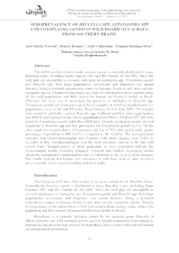Seroprevalence of brucella spp, lepstospira spp and toxoplasma gondii in wild board (sus scrofa) from southern Brazil.
Seroprevalence of brucella spp, lepstospira spp and toxoplasma gondii in wild board (sus scrofa) from southern Brazil.
Author(s): TREVISOL, I. M.; KRAMER, B.; COLDEBELLA, A.; SILVA, V. S.
Summary: Abstract:The wild boar (Sus scrofa), exotic invasive specie, is currently distributed in many Brazilian states, including Santa Catarina (SC) and Rio Grande do Sul (RS). Since the wild pigs are susceptible to zoonotic pathogens as Leptospira spp, Toxoplasma gondii and Brucella spp, their large populations, movements and dispersion can spread diseases, being a potential transmission source to humans, livestock and other sylvatic sympatric species. Despite its importance are there few information about sanitary status of this wild populations and their impact for human and livestock health in Brazil. Objective this work was to investigate the presence of antibodies to Brucella spp, Toxoplasma gondii and Leptospira spp in blood samples of wild boar legally hunted for population control in SC and RS states. From January 2014 to July 2016, 193 samples were tested to antibodies against Brucella spp (buffered acidified plate agglutination test-BAPA) and Leptospira spp (micro agglutination test-MAT). Of these 193, 149 were tested to Toxoplasma gondii antibodies (HAI test). Overall, serological results showed negativity to Brucella spp and low prevalence for Toxoplasma gondii (2,7%). On the other hand, the seroprevalence of Leptospira spp was 6,74% with significantly greater percentage of positivity in RS (12,5%) compared to SC (3,88%). The most prevalent serovars ware Icterohaemorragiae and Pomona, with titers ranging from 1:400 to 1:12,800 in RS. Icterohaemorragiae was the most prevalent serovar in SC but with lowest titres. Seroprevalence of these pathogens in wild population indicate the environmental health, including sympatric livestock and wildlife. Ecological factors should be considered to understand the role of wild boars in the cycle of these diseases. Our results indicate that hunters and consumers of wild boar meat of must be aware about zoonotic risk in carcass handling and meat intake.
Publication year: 2017
Types of publication: Paper in annals and proceedings
Unit: Embrapa Swine & Poultry
Keywords: Brasil, Javali, Safe pork, Sanidade animal, Santa Catarina, Segurança alimentar
Observation
Some of Embrapa's publications are published as ePub files. To read them, use or download one of the following free software options to your computer or mobile device. Android: Google Play Books; IOS: iBooks; Windows and Linux: Calibre.
Access other publications
Access the Agricultural Research Database (BDPA) to consult Embrapa's full library collection and records.
Visit Embrapa Bookstore to purchase books and other publications sold by Embrapa.

